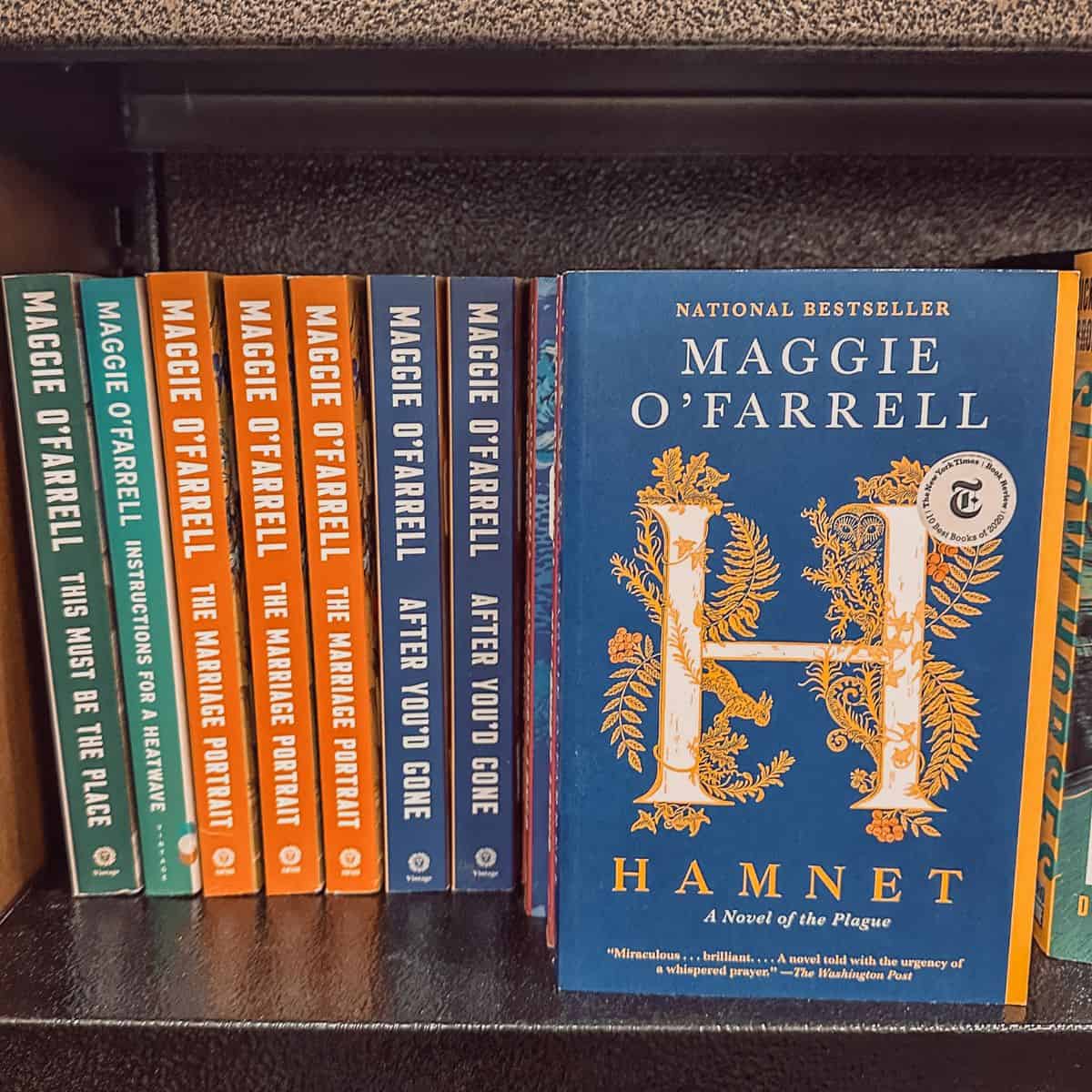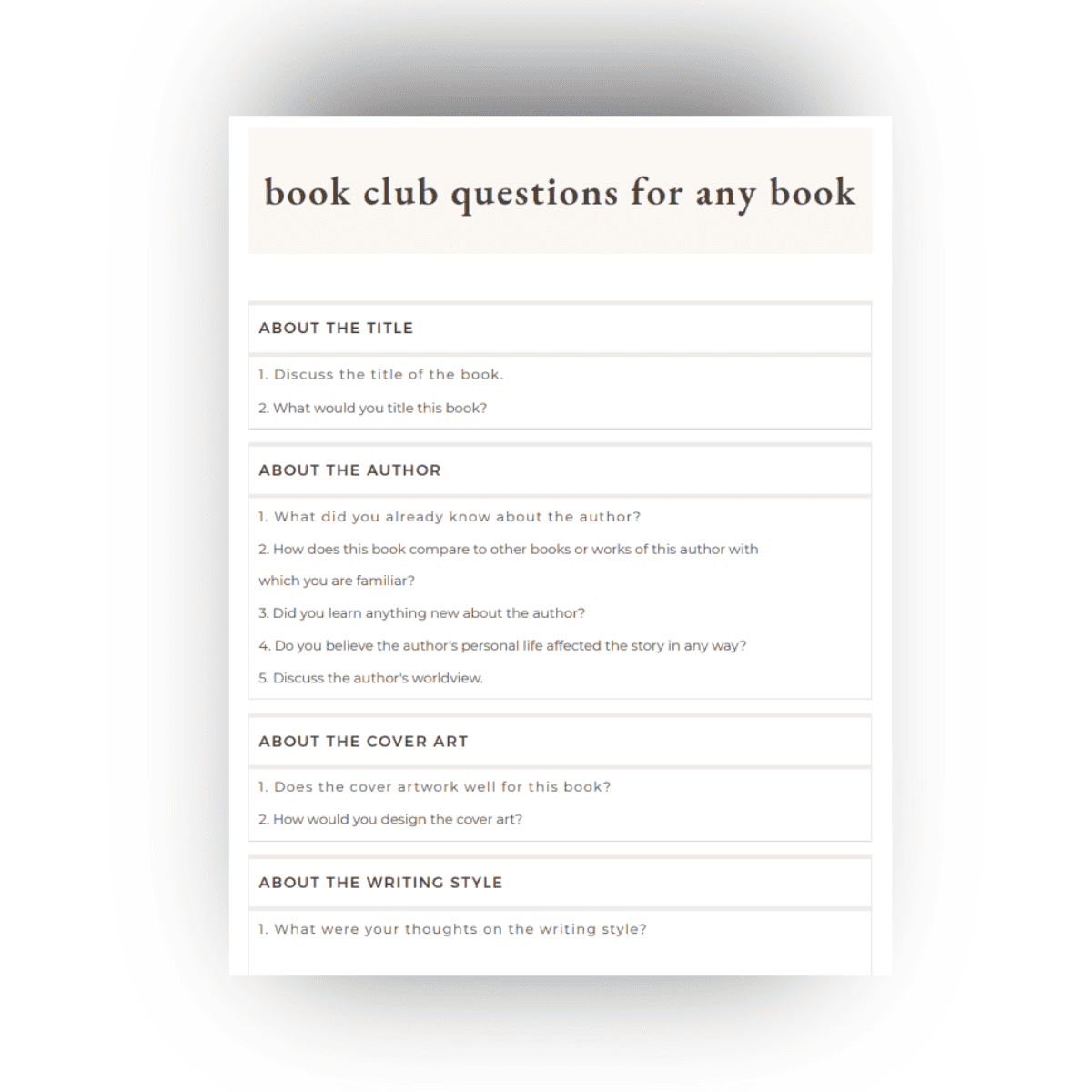Explore thought-provoking Hamnet book club questions here. Maggie O’Farrell’s bestselling, award-winning “Novel of the Plague” offers plenty to discuss about the death of William Shakespeare’s son.
You’ll foster meaningful discussion and get free printable book club questions to prepare for your in-person book club. Get started below.

Hamnet Book Club Questions
Was Hamnet an easy or hard read for you?
What do you know of Shakespeare’s life outside of this novel?
What did you know about “The Black Death” prior to reading?
Discuss the image appearing on the book cover.
If you read both, compare and contrast Hamlet and Hamnet.
Hamnet and Hamlet are said to be interchangeable names. Still, why do you think Shakespeare chose a slightly different name for his play?
Why do you think O’Farrell chose the title Hamnet?
O’Farrell stated there are “scant historical facts” known about the Shakespeare family (thus, much of her novel is speculation). Does this change your opinion on the contents of Hamnet?
The true cause of death of Hamnet is unknown. Does this change your opinion on the contents of Hamnet?
Do you think any of the accounts in Hamnet were likely to have occurred as written?
What genre would you describe Hamnet as: based on a true story, historical fiction, literary fiction, or something else?
Shakespeare never refers to “The Black Death” (The Plague) in his writing. What do you make of this?
Shakespeare is only referred to as the “Latin tutor” and similarly general names in Hamnet. Why do you think O’Farrell made this choice?
Did you like O’Farrell’s unique writing style, overflowing with detailed descriptions?
In Hamnet, the chapters about the past are longer and the chapters about the present are shorter. Do you think there is significance in this pacing?
Did you like or dislike the dual timelines in Hamnet?
Discuss the use of foreshadowing in premonitions in Hamnet.
Discuss the theme of motherhood that was woven heavily throughout this book about motherhood.
Discuss the theme of childbirth that was woven heavily throughout Hamnet.
How were Agnes’s childbirth experiences similar and different?
Discuss the significance of Agnes being a healer.
Discuss the significance of Shakespeare’s difficult relationship with his father.
Describe Agnes’s personality type.
How were life and death scenes juxtaposed in Hamnet?
Discuss the similarities and differences among the mother figures in Hamnet.
Given that Hamnet’s father is a famous figure, why do you think O’Farrell focused so much more heavily on his mother’s experiences?
Were apples meant to be symbolic in their use during the scene involving the physical relationship between Hamnet’s parents?
What caused Agnes and William Shakespeare to fall in love?
How do Agnes and William Shakespeare show parental love similarly and/or differently?
Discuss the sibling bond between Hamnet and Judith.
Discuss the differences between Bartholemew and William Shakespeare.
Eliza’s note to William Shakespeare about Judith’s illness is handwritten in the print copy. Why do you think this choice was made?
Discuss the irony in Agnes being a healer?
Discuss the irony in the death of Hamnet versus Judith.
Why do you think O’Farrell chose for both Judith and Hamnet to become ill?
Judith’s illness occurs over far more pages than Hamnet’s. Why do you think O’Farrell made this choice?
Why do you think O’Farrell chose not to have Hamnet’s father present for his death?
Discuss the theme of grief in Hamnet.
Discuss how each member of the family coped with grief.
The events of Hamnet occurred hundreds of years ago. How is grief similar and different today?
Did the members of the Shakespeare family have regrets and/or guilt about Hamnet’s death?
In the beginning of Part II, King Hamlet is quoted, asking for his story to be told. Discuss the significance of this.
Discuss the changes to the Shakespeares’ home after the death of Hamnet.
Discuss the changes in the Shakespeare family after the death of Hamnet.
Why do you think O’Farrell had Joan deliver the news about Shakespeare’s play?
Discuss the final sentence of Hamnet.
O’Farrell has said she wrote Hamnet to give a voice to an overlooked person in Shakespearean history. Did she do his (largely unknown) story justice?
O’Farrell is no stranger to writing about death — her book I Am, I Am, I Am is about seventeen brushes she herself had with it. Do you think this is coincidental?
Compare and contrast “The Black Death” (pestilence) with COVID-19.
What do you recommend to read after Hamnet? (I recommend Hamlet; I Am, I Am, I Am; and Lincoln in the Bardo.)
The last line of Maggie’ O’Farrell’s novel is “Remember Me,” said by Shakespeare, who is acting as the ghost in the play Hamlet. In Hamlet (the play) this line is often interpreted as the ghost of dead king Hamlet (who has been murdered by his brother) asking that young Hamlet seeks revenge. Why does Maggie O’Farrell conclude her story with this line?
Printable Discussion Questions
Download printable book club discussion questions to prepare for your in-person book club below.

FREE BONUS
Subscribe to The Literary Lifestyle’s email newsletter. You’ll get an exclusive, printable PDF of book club questions for any book.
Why Hamnet Is a Good Book Club Book
- national bestseller
- Women’s Prize for Fiction Winner
- National Book Critics Circle Award Winner
- Named “Novel of the Year” at the Dalkey Literary Awards
- Shortlisted for the Walter Scott Prize
- Longlisted for the Andrew Carnegie Medal for Excellence in Fiction
My Rating: ★★★★★
Hamnet is a great book club book, given its meticulous plotting, heavy use of literary devices, lush writing style, and real-life inspiration. It works well for fans of The Great Alone and Tom Lake.
Set in England during the late 1580s, Hamnet is loosely based on the death of William Shakespeare’s eleven-year-old son, Hamnet, from “The Black Death,” which inspired his famous play, Hamlet, about an opposing scenario in which a son grieves his father, King Hamlet.
Hamnet shifts timelines between the story of Shakespeare’s relationship with his wife, Agnes (also known in history as Anne), and the illness that begins with Hamnet’s twin sister, Judith, and ultimately ends with him, just as William Shakespeare’s playwrighting career is taking off.
Ultimately it’s a family drama novel about grief and one of the best books of the 21st century.
READING TIPS
- You need not read Hamlet before Hamnet, but you can indulge in these Hamlet quotes to enhance your reading experience.
- Hamnet is a slow, methodical read. It’s hard, it’s heavy, it’s slow… and it’s 100% worth it. So, keep at it!
- If your club loved this book and wants a similar book to read next, check out these Demon Copperhead Book Club Questions for another heavy historical fiction read.
Frequently Asked Questions
Yes, Hamnet by Maggie O’Farrell is good for book clubs, given its meticulous plotting, heavy use of literary devices, lush writing style, and real-life inspiration based on the death of William Shakespeare’s son, Hamnet, which inspired his play, Hamlet.
Author Maggie O’Farrell explained that Shakespeare is not named in Hamnet because his massive fame distracted from the narrative about the death of his son and familial grief.
Hamnet by Maggie O’Farrell shows that grief can be coped with by transforming it into art. It also explores marriage and parenthood in the context of the death of a child.
Conclusion
These Hamnet book club questions foster introspective discussions and deeper connections to O’Farrell’s intricate portrayal of grief, marriage, parenthood, and art. It’s a great selection for fans of Shakespeare, historical fiction and/or literary fiction. May your discussions be as immersive as the novel itself.
Keep the discussion going! Share your thoughts on Hamnet or any remaining questions you may have in the comments below.



I have heard amazing things about this book a few times now! I personally need to be in the right frame of mind for this kind of book. I also am a voracious note taker with books like these, and that takes a lot of mental energy and dedication that I haven’t had for quite awhile. I’m going to put it on my (never-ending, overwhelming, one day “soon”) TBR list, and maybe I’ll eventually get to it! When I do, I’ll come back to this page. Thanks so much for sharing!
You’re welcome. I was in the same boat as you. I kept hearing about it but never thought the time was right… until it was! If you like to take notes, I definitely think you will like this book. You can analyze just about every writing decision that was made.